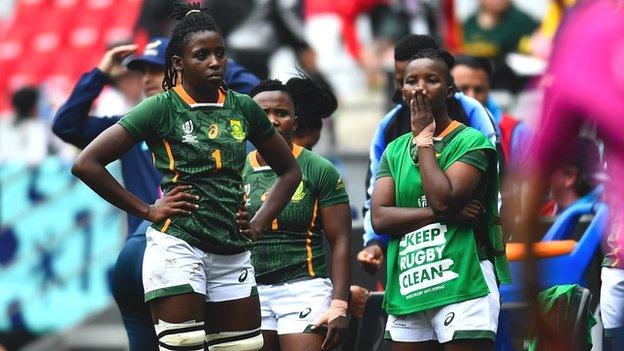Rugby World Cup Sevens: South Africa hosting opens doors for Africa
- Published

Rugby World Cup Sevens' winners Fiji (men) and Australia (women) celebrate the titles won on South African soil
With over 100,000 fans passing through the turnstiles over three days to generate a festive atmosphere in the true Cape Town tradition, the eighth edition of World Rugby's Sevens World Cup has been hailed as a major success.
The smooth running of the tournament, which was held on African soil for the first time, could pave the way for other African countries to host the tournament and other international events in future.
"There are pathways like the Challenger tournament for countries to host the bigger events," said Alan Gilpin, chief executive of World Rugby.
He added that the Sevens tournament, which featured 40 teams in total, with 24 men's and 16 women's sides, provided a great opportunity for other African countries to host a World Cup in future.
The Challenger Series, which sees 12 men's and women's teams participating, was introduced in 2020 to boost Sevens' development across the world, with the winners gaining promotion to the World Series.
The latest Challenger Series tournament was hosted in August by Chile.
Despite the World Cup's success, the knockout format and the long sessions, which lasted from 10am in the morning until after 11pm, came in for criticism from many fans and sections of the media.
"This event is unique given the number of teams and we'll look at the feedback we get from players and spectators," Gilpin told the media.
"Certainly, it's not fixed in stone for the future."
Hosts' disappointing displays

Fans arrived in a variety of costumes for the Rugby Sevens World Cup in Cape Town
On the field, the African teams, especially the top-seeded South African men's team, the Blitzboks, had a disappointing tournament.
After a routine 23-9 win over Chile in the opening round, they lost 24-14 to Ireland in the quarter-finals in a game that started at just after half past ten on Saturday evening.
The quarter-final defeat of a Blitzboks team expected to go deep into the tournament after winning the gold medal at the Commonwealth Games in July took away some of the tournament's lustre for home fans.
The expectation had been that coach Neil Powell would be given a perfect send-off in his last tournament with a team he's led for nine years before taking up a director of rugby role with the Sharks franchise.
Powell enjoyed a rewarding tenure with the Blitzboks, being the only individual to win the World Series as player and coach, having guided the team to three World Series titles and two Commonwealth golds.
After another defeat, this time to Argentina, the home side finally gave the fans something to cheer about when they defeated Samoa 35-5 in the 7/8th place playoff.
The South African women's team did not fare much better as they finished in 13th spot, after losing 21-19 to China.
Their only victory came against Colombia when the exciting Nadine Roos scored four tries in a convincing 27-0 win.

On the pitch, the host nation endured sub-par performances
Victors' heart-warming gesture
It was against the hapless South Americans that debutants Madagascar, who won the hearts of the fans, also claimed their only win when they prevailed 19-12 to avoid the wooden spoon as they finished in 15th place.
In a poignant moment after their 48-0 thumping in the first round by Australia, the eventual winners of the women's title invited the Indian Ocean island team to their dressing room where they handed over their alternative kit to a side that had funded its own travel to Cape Town.
For the Australians, the gesture was "a mark of respect to their opponents and also a good reality check to our girls with how lucky and fortunate we are to have the support and infrastructure we have."
The other African men's teams also performed below their hopes, with Kenya and Zimbabwe each managing just one win against Scotland and Jamaica respectively. Uganda, meanwhile, scored victories over Korea and Germany.